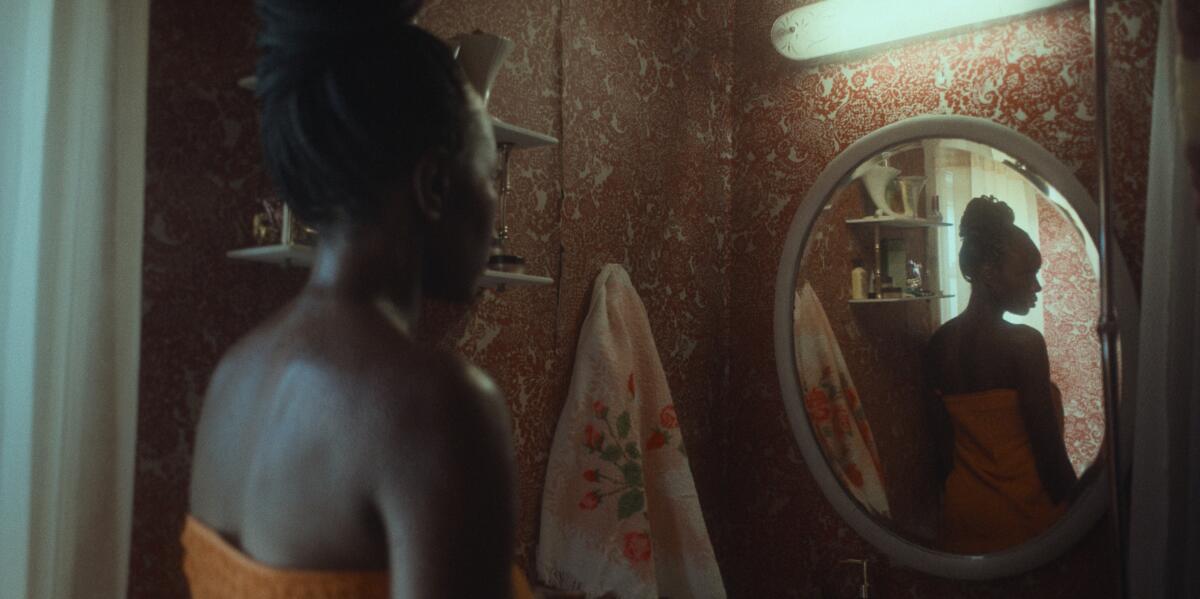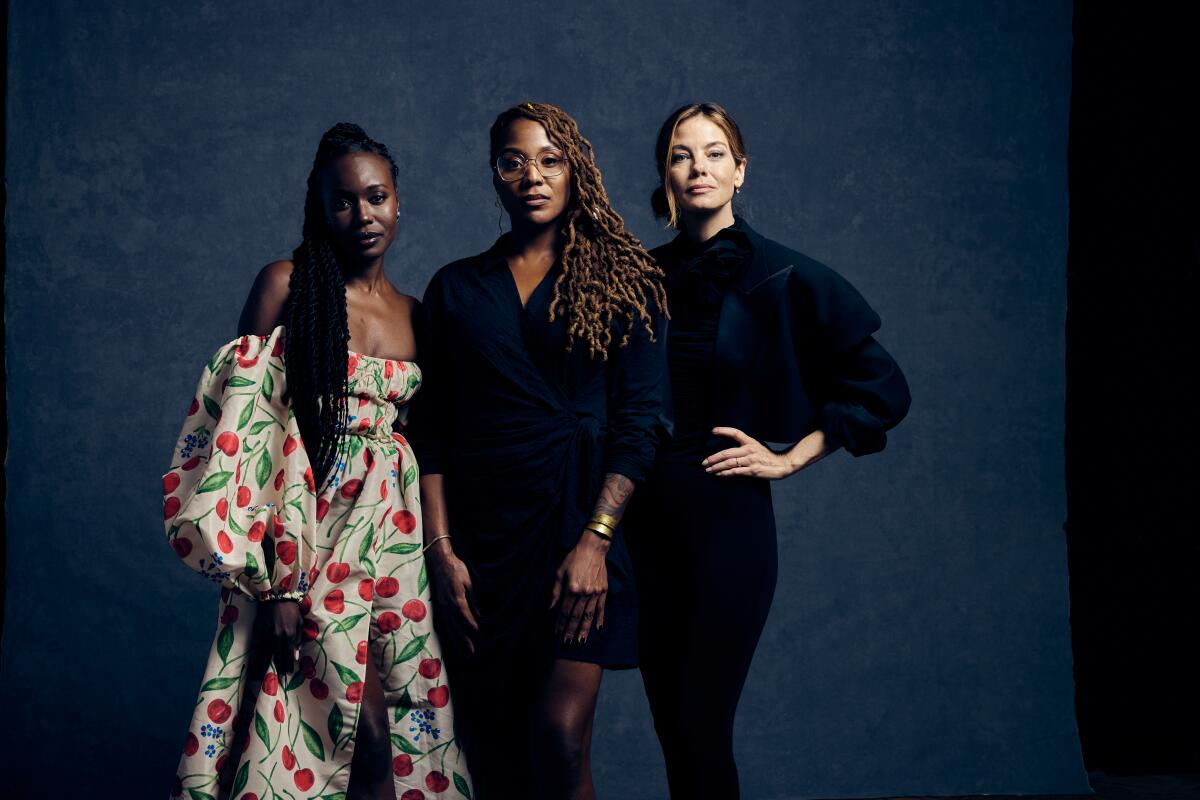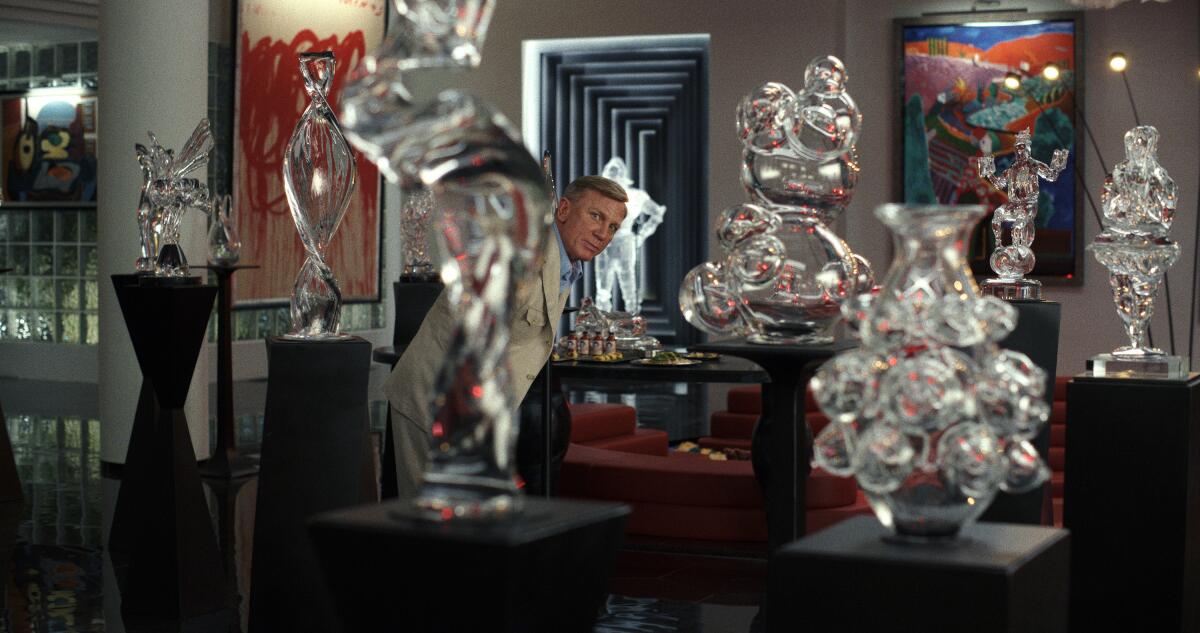Nikyatu Jusu’s modern folk-horror in ‘Nanny’

Hello! I’m Mark Olsen. Welcome to another edition of your regular field guide to a world of Only Good Movies.
Only good movies
Get the Indie Focus newsletter, Mark Olsen's weekly guide to the world of cinema.
You may occasionally receive promotional content from the Los Angeles Times.
Robert Downey Jr.’s tribute to “Sr.” In theaters now and streaming Dec. 2 on Netflix, “Sr.” is a look at the life and career of filmmaker and actor Robert Downey Sr., who made 1969’s groundbreaking “Putney Swope” and whose iconoclastic worldview became something of an animating principle for those he influenced, including filmmaker Paul Thomas Anderson. Directed by Chris Smith, who has been crafting portraits of headstrong eccentrics going back to “American Movie,” the film focuses on the relationship between Downey Sr. and his son, Robert Downey Jr., as the elder Downey is in the last phase of his life. He died in 2021.
Gary Goldstein reviewed the film for The Times, noting, “This is mostly a buoyant and affectionate portrait, one that enjoyably showcases Downey Sr.’s sweet irascibility (and undeniable charm), Jr.’s offhand jauntiness and the puckish duo’s mutual love of film, family and irreverence. That is its strength and, it seems, raison d’être. … ‘Sr.’ proves a tender portrait and fitting tribute to an offbeat hero and creative pioneer.”
“On the Come Up” screening event. We will have an Indie Focus Screening Series event next week on Thursday, Dec. 1, with “On the Come Up,” the feature directing debut for Sanaa Lathan: the story of an aspiring young female rapper. For the Q&A we will have Lathan, who also appears in the movie, with actors Jamila C. Gray and Da’Vine Joy Randolph.
This will be our first event at the Lumiere Cinema at the Music Hall in Beverly Hills, a theater I always enjoy going to as a patron. RSVP here.
Enjoying this newsletter? Consider subscribing to the Los Angeles Times
Your support helps us deliver the news that matters most. Become a subscriber.
‘Nanny’
Written and directed by Nikyatu Jusu, “Nanny” won the Grand Jury Prize at this year’s Sundance Film Festival and is one of the year’s most electrifying debut features. A Senegalese immigrant named Aisha (Anna Diop) takes a job as nanny to an upscale couple (Michelle Monaghan, Morgan Spector) in New York City, hoping to earn enough money to bring her own young son to the U.S. As she grapples with the increasingly fraught dynamics with her employers, she begins to have visions that take on a life of their own. The movie is in theaters now and on Amazon Prime Video on Dec 16.
For The Times, Robert Abele wrote, “Jusu’s fantastically self-assured debut feature, which garnered her a Sundance jury prize this year, refreshingly approaches horror more as a dramatic prism than a genre template. There’s no ‘The’ in the title for a reason (aside from the fact that it’s not a cheesy caretaker-gone-bad date-night frightfest): In her elegantly unsettling portrait of an invisible woman straddling two notions of home — far from what she’s known, working inside a perilous system — Jusu is letting us know she’s got all diasporic women employed by wealthy families on her mind. And that their fears can easily become nightmares.”
As part of last week’s holiday movie preview, Sarah-Tai Black spoke to Jusu, who made “Nanny” after a series of short films. Jusu talked about her development in her work: “It’s very organic in terms of the way that I move through the world in my body and the way that I see the world. I’m lucky in the sense that I’m able to be as honest a filmmaker as I am and still be supported. That’s rare. I couldn’t see it being any other way — it’s the only way I know how to be. I’m grateful to be able to stay true to myself and progress in my work, although I probably would’ve been able to progress faster had I not been who I am.”
For the New York Times, Manohla Dargis wrote, “Jusu draws fluidly from different genres and modes in ‘Nanny’ — from scene to scene, the movie plays like an immigration drama, a lonely woman melodrama and a cruel labor farce — but at one point you realize that what you are watching looks, sounds and feels like a horror movie. It is, though its frights tend to be more intellectual than visceral, and here water gushes instead of blood. … The tonally discrete performances carve out two powerfully distinct narrative spaces for these characters, one who fades into irrelevancy as Aisha battles and endures, finding a place in a world in a movie from a filmmaker who’s already found hers.”
For the Hollywood Reporter, Jourdain Searles wrote, “With ‘Nanny,’ Jusu crafts a contemplative, thematically rich story that deftly explores the emotional and spiritual costs of leaving your homeland behind for an uncertain future in a strange land. Diop is elegant and understated as Aisha, a loving mother with quiet strength, commanding presence and an unbreakable bond to Senegal and the conditions that made her. It’s a perfect marriage of director and star, with Jusu providing a worthy showcase for Diop’s talents as a leading lady. … At its root, ‘Nanny’ is a story about the otherworldly power of cultural connection and the ways it may guide you when you’ve lost your way.”
For Deadline, Valerie Complex wrote, “[The film] is aided by Diop’s quiet and moving performance which is a stark contrast to her work on HBO Max/DC comics live action ‘Titans’ series. She performs with a sense of sincerity, and the audience can see every time the character experiences a change in emotion or feeling. It helps that she’s well lit, so we can see her facial expressions and connect to Aisha’s plight. I say that because too often actors of her skin tone are victims of poor lighting in film. ‘Nanny’ juggles a lot of concepts. Past, present, future, language, culture and horror together in a story about what happens when you don’t heed warnings. While it doesn’t address everything in a seamless way, the message is loud and clear. Jusu has a style that is unique, and her debut film shows the director has a promising future in Hollywood and the horror genre.”

Enjoying this newsletter? Consider subscribing to the Los Angeles Times
Your support helps us deliver the news that matters most. Become a subscriber.
‘Glass Onion: A Knives Out Mystery’
Written and directed by Rian Johnson, “Glass Onion: A Knives Out Mystery” brings back the character of Benoit Blanc, played again by Daniel Craig, from the 2019 hit “Knives Out.” This time Blanc has been called to a private Greek island to spend the weekend with a tech billionaire (Edward Norton) and his friends (including Janelle Monae, Kate Hudson, Leslie Odom Jr., Dave Bautista and Kathryn Hahn) for a murder mystery party. Then a real murder happens. In an unusual move for the company, Netflix released the movie to hundreds of theaters for one week, through Nov. 29 before its streaming debut Dec. 23.
By the way, longtime Johnson collaborator Noah Segan — who also returns to “Glass Onion” from “Knives Out,” albeit in a new role — sees his own debut as writer-director, “Blood Relatives,” premiere this week on the streaming service Shudder. A disarming, delightfully sweet film about family and tradition, the story is about a 115-year-old Jewish vampire (Segan) who encounters a young daughter (Victoria Moroles) he never knew he had.
For The Times, Justin Chang wrote of “Glass Onion”: “Cleverness, however, remains very much Johnson’s stock-in-trade. He’s uncannily good at misdirection, at smuggling clues into throwaway dialogue and keeping the identities of not only his killer(s?) but also his victim(s?) under wraps for a remarkably long stretch. And in keeping with the title’s governing metaphor — a puzzle that is at once fiendishly multilayered and wholly transparent — he’s skilled enough to hide some of his most incriminating evidence in plain sight. The central mystery hinges on an audacious structural coup that produces a succession of giddy, breathless moments in the movie’s second half, as cinematographer Steve Yedlin and editor Bob Ducsay excel at reframing earlier plot points from revelatory new perspectives. If the actual solution doesn’t turn out to be as elaborate or airtight in its construction as ‘Knives Out’ was, that’s partly because the satirical dynamics — the inequity between the power Miles wields and the friends cowering and seething in his shadow — don’t entirely allow for it.”
Perhaps speaking to the level of expectation around the film, I previously wrote about the world premiere of “Glass Onion” at the Toronto International Film Festival, did a short next-day interview with Johnson and a subsequent profile of Craig.
For the New York Times, A.O. Scott wrote, “I can’t say much about what happens in ‘Glass Onion’ without giving away some surprises, but I can say that some of the pleasure comes from being wrong about what will happen next. … I also won’t give away any jokes. It’s been a while since I’ve laughed out loud in a movie theater, but I did, partly because a lot of people around me were laughing, too. (I don’t know if the effect would be the same watching the movie at home on Netflix.) ‘Glass Onion’ is completely silly, but it’s not only silly. Explicitly set during the worst months of the Covid pandemic — the spring of 2020 — ‘Glass Onion’ leans into recent history without succumbing to gloom, bitterness or howling rage, which is no small accomplishment. One way to interpret the title is that a glass onion may be sharp, and may have a lot of layers, but it won’t make you cry.”
For Vulture, Alison Willmore wrote, “‘Glass Onion’ is bigger and more precisely designed than ‘Knives Out,’ but what makes it a more satisfying movie is that it sits with its characters more rather than immediately showing off their decay. Instead, theirs is the kind of hollowness that comes from a lifetime of smaller moral compromises, until suddenly you’re on a Greek island with some old friends, contemplating murder. … Unlike ‘Knives Out,’ which verged on the self-congratulatory in its politics, ‘Glass Onion’ allows its class critiques to be built into the characterizations of its rogues’ gallery of suspects, who are also living through a moment that temporarily united so much of the world, but who are not like the rest of us at all.”

‘Devotion’
Directed by J.D. Dillard, from a screenplay by Jake Crane and Jonathan Stewart, “Devotion” is set during the Korean War and tells the story of Jesse Brown (Jonathan Majors), the first Black pilot in the U.S. Navy, and his friendship with fellow aviator Tom Hudner (Glen Powell). With thrilling flying sequences for anyone who didn’t get enough from “Top Gun: Maverick,” which also starred Powell, the movie is in theaters now.
For Tribune News Service, Katie Walsh wrote, “Working with Academy Award-winning cinematographer Erik Messerschmidt, Dillard creates an aesthetic for ‘Devotion’ that harks back to classic war films: The pilots’ Brylcreemed coifs gleam against their leather bomber jackets; their shiny new Corsair planes sweep triumphantly through the clouds of coastal New England during their training flights. … Tonally, ‘Devotion’ remains steady, never going for over-the-top emotion or sensation, simply seeking to express something authentically moving and human. It unmistakably achieves that, delivering a stirring story of friendship during war, and beyond, that is both rare and real.”
Robert Daniels spoke to Dillard, Majors and Powell, also a producer on the film, about the project. Dillard’s own father, Bruce Dillard, was only the second African American to fly with the Navy’s Blue Angels flying team and served as a consultant on the film. For Dillard the director, having his father there was invaluable.
“I’m not just asking my dad about the proper radio signal when you’re on a dive attack,” J.D. Dillard said. “But weirdly, the more helpful things were questions like: What was the tenor in the room when you told Mom you were going on cruise for the first time? How hard was that? And what about when you were on the ship and you felt insanely isolated yet still needed time alone? Where did you go?”
For the Guardian, Charles Bramesco wrote, “Sturdy if unexceptional, this prime cut of dad-bait hangs on the performances of Majors and Powell, two abundantly charming men hamstrung by straightforward material. The latter has an all-American face that looks like privilege made flesh, full of prep school educations and rugby trophies and summers on the compound. He’s an apt counterpoint to Majors, sculpted for a stoicism rooted not in masculine repression, but in carefully maintained control over anger. His whole life, he’s had to work twice as hard to get half as far, a trite biopic standby that Majors does his best to redeem with stifled frustration and exhaustion.”

Only good movies
Get the Indie Focus newsletter, Mark Olsen's weekly guide to the world of cinema.
You may occasionally receive promotional content from the Los Angeles Times.




